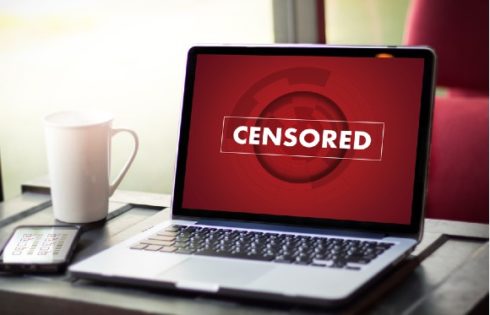
The University of Texas at Austin faces a lawsuit accusing the administration of stifling academic freedom, threatening professors and limiting free speech.
The lawsuit was filed Feb. 8 by Richard Lowery, a conservative finance professor at UT Austin.
Lowery alleges that his job, salary, research opportunities and academic privileges have been threatened as a result of his outspokenness on social media and via email. The firebrand professor is a frequent critic of critical race theory and diversity, equity and inclusion policies and programs.
UT Austin’s media relations department declined to comment to The College Fix about the lawsuit.
As a critic of both his employers in particular and higher education’s left-leaning bent in general, Lowery was active on Twitter and often quoted in news articles up until August 2022, when he chose to self-censor out of fear, the lawsuit contends.
The suit alleges Lowery’s job and job duties have been threatened by some of his superiors as a result of his public criticisms. Lowery’s comments can be found in The Hill, College Fix, Houston Chronicle, Ft. Worth Star-Telegram, Washington Times and other outlets.
The Free Speech Institute, which represents Lowery, has asked the courts to: bar UT officials from threatening or acting on threats made against Lowery for his protected speech; declare that the threats against Lowery amounted to unconstitutional state action designed to chill Lowery’s protected speech and retaliate against him’ and award costs and attorney’s fees as provided by federal law.
“The First Amendment protects the right of citizens to criticize government officials, including administrators at Texas’ flagship state university for their use of public funds for ideological indoctrination, and their hostility to viewpoint diversity and academic freedom,” the complaint states.
It added that the First Amendment “also protects the right of public university professors to engage their colleagues and administrators in debate and discussion concerning academic matters, including what should be taught and the school’s ideological direction and balance.”
Endel Kolde, Lowery’s attorney, told The College Fix via email that he plans to make a motion for a preliminary injunction asking the court to protect Lowery’s right to speak “without threats to his job or job duties.” That motion “will contain additional evidence and details,” he said.
Kolde said he also seeks a permanent injunction that will protect Lowery’s right to free speech.
“If not, we are in this case for the long haul, and that would potentially include an appeal to the Fifth Circuit Court of Appeals or beyond,” he said.
The lawsuit alleges that the campaign to silence professors at UT Austin began with Carlos Carvalho, another outspoken professor. Carvalho, the executive director for the Salem Center for Public Policy, is a supervisor of Lowery’s.
When Carvalho resisted calls for disciplinary action against Lowery, he was allegedly threatened and told by his boss: “I don’t need to remind you that you serve at my pleasure.”
Lowery and Carvalho also sought funding for a Liberty Institute on UT’s campus as a counter to DEI and critical race theory training. Their efforts, however, were allegedly sidelined by President Jay Hartzell.
“The Texas legislature’s 2022-2023 state budget allocated $6 million in funding for the Liberty Institute,” Kolde noted.
“The enabling legislation was somewhat vague, which allowed President Hartzell and his allies in the UT Administration to hijack the project,” Kolde added in the court brief.
According to the complaint for declaratory and injunctive relief, Professor Lowery stopped tweeting in August 2022 due to extensive threats from faculty and administration at UT Austin. Lowery was fearful of losing his research position with the Salem Center, costing him the $20,000 annual stipend.
In June 2022, Lowery had commented on the affirmative action cases involving UNC and Harvard in an op-ed in the Washington Times.
“The explanation of why universities fight so hard for such morally repugnant policies, even in the face of increasing evidence that they harm the intended beneficiaries, not just the intended targets, is actually quite simple: hate,” he wrote.
“The takeover of universities by critical race theorists — often through the mechanism of ‘diversity, equity and inclusion’ offices and the strategic placement of critical race theorists in positions of authority — is effectively complete.”
Lowery was also quoted in The Texas Tribune criticizing President Hartzell: “The President of UT, in coordination with one of his chief deputies, Richard Flores, chose to completely default on the plan agreed to for bringing needed intellectual diversity to campus and push back against the persistent attacks on free inquiry and academic freedom at UT-Austin.”
Lowery is tenured, Kolde said. If the university succeeds at censoring professors like Lowery, the affiliations with research centers and yearly stipends will become a natural pressure point, he said.
Lowery is also the key plaintiff in a lawsuit filed in September 2022 against Texas A&M University that alleges the public institution is creating a program in which scholars of color will be given preferential hiring treatment over white and Asian males.
“We have no plan other than to represent Richard Lowery to the best of our ability in this case, Lowery v. Mills et al.,” Kolde added. “Of course, we hope this lawsuit does cause other university administrators to think twice before engaging in similar censorship.”
“If there is any other professor at UT, or any other state university, who has had a similar experience to Richard’s, they can always get in touch with us and we would be happy to evaluate their case.”
MORE: University of Texas System suspends new DEI policies, launches probe into current ones
IMAGE: Salem Center
Like The College Fix on Facebook / Follow us on Twitter






Please join the conversation about our stories on Facebook, Twitter, Instagram, Reddit, MeWe, Rumble, Gab, Minds and Gettr.